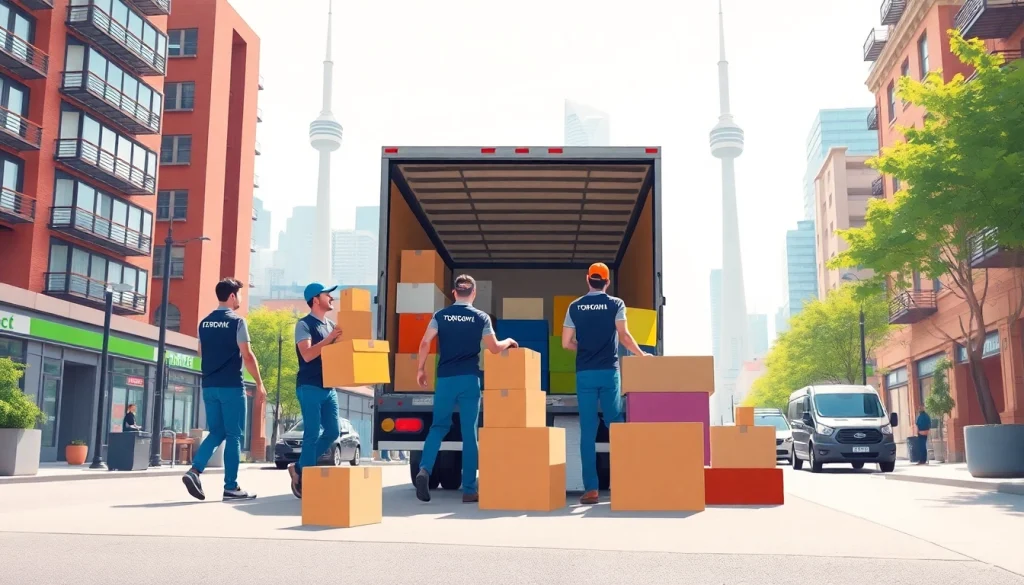Understanding Toronto Moving Services
Moving can be an overwhelming experience, especially in a bustling metropolis like Toronto. With its diverse neighborhoods, dense urban environment, and varying laws regarding transportation and parking, a successful move requires careful planning and executed logistics. This is where Toronto moving services play a critical role. These services provide tailored support for residential and commercial relocations, ensuring a smoother transition to your new space.
Types of Moving Services Available
Toronto moving services encompass a wide range of options to accommodate different needs. Understanding these types can help you choose the right service for your relocation.
- Residential Moving: This service is designed for individuals or families moving homes, whether it’s a house, apartment, or condo. It typically includes packing, loading, transporting, and unloading personal belongings.
- Commercial Moving: Ideal for businesses relocating their offices, this service focuses on minimizing downtime and ensuring that all equipment, furniture, and documents are transferred securely.
- Long-Distance Moving: For relocations beyond city limits, specialized long-distance moving services execute intricate logistics involving more extensive routes, often personalized for a client’s needs.
- Packing Services: Some moving companies offer professional packing services, providing trained personnel to pack your belongings efficiently and safely, often utilizing industry-grade materials.
- Storage Solutions: If your new place isn’t ready or if you’re decluttering, many moving services provide temporary storage solutions that keep your items safe while you transition.
- Specialized Item Moving: This service caters to transporting large or delicate items like pianos, artwork, or antiques, requiring extra care and expertise.
Key Features of Professional Movers
Choosing a professional moving service offers several advantages that can simplify your moving experience. Here are some key features to consider:
- Experience and Expertise: Professional movers possess the necessary experience to handle a move efficiently, utilizing proven techniques and equipment to safeguard your belongings.
- Insurance Coverage: Many moving companies provide insurance options to protect your valuables during the move, offering peace of mind in case of unforeseen circumstances.
- Customizable Services: Companies often provide flexible options tailored to meet specific moving needs, whether it’s last-minute moves or phased transitions.
- Proper Equipment: Access to specialized packing materials, dollies, ramps, and vehicles designed specifically for moving ensures that your belongings are transported securely.
- Time Efficiency: Thanks to their experience and organized processes, professional movers can often complete a move much faster than individuals trying to manage it themselves.
How to Choose Reliable Moving Services
Selecting the right moving service is crucial to ensuring a successful relocation. The following tips can assist you in making an informed choice:
- Research and Reviews: Start with extensive research, leveraging customer reviews and ratings on several platforms to gauge the reliability of potential movers.
- Get Multiple Quotes: It’s advisable to obtain quotes from several companies. This not only gives you a sense of market pricing but also provides insights into the services offered.
- Check Credentials: Ensure the moving company is licensed and insured adequately. This protects you legally and financially in case of incidents during the move.
- Ask Questions: Don’t hesitate to inquire about their procedures, equipment, and experience. Understanding their policies related to damages and delays is crucial.
- Trust Your Instincts: Your comfort level with a moving company is paramount. If something feels off during communication, it might be best to look elsewhere.
Preparing for Your Move
Proper preparation can alleviate much of the stress associated with moving. Following structured guidelines can streamline your experience.
Checklists for Efficient Packing
Creating a packing checklist is essential to stay organized. Here’s a simple structure you can implement:
- Start Early: Begin your packing process at least a few weeks before your move date to avoid last-minute chaos.
- Sort and Declutter: Go through each room and decide what to keep, donate, or discard to lighten your load.
- Gather Supplies: Collect boxes, packing tape, bubble wrap, and markers for labeling. Using quality materials can prevent damages during transit.
- Room-by-Room Packing: Focus on one room at a time, packing items you frequently use last to make your temporary living conditions more comfortable.
- Labeling: Clearly label each box with its contents and the room it belongs to. This will save time during unpacking.
Tips to Ensure a Smooth Move
To further enhance your moving experience, consider these practical tips:
- Confirm Arrangements: Double-check your moving date, confirm times with the moving company, and ensure they have the correct addresses.
- Prepare Essentials: Have a designated box for essential items, such as medication, important documents, and daily necessities, to make them easily accessible during the transition.
- Communicate with Your Movers: Ensure that your moving team understands your preferences regarding heavy items, fragile belongings, and special requests for setup in your new space.
- Arrange Transportation: If you have pets or small children, take arrangements in advance to ensure they are cared for during the moving process.
Understanding Moving Costs
Moving costs can vary greatly depending on various factors, so understanding what influences pricing can help you budget effectively:
- Distance of Move: Local moves are typically charged by the hour, while interstate or long-distance moves can incur additional costs based on weight and distance.
- Full-Service vs. Basic Services: Opting for full-service movers will increase costs, while handling your own packing may reduce the overall expense.
- Time of Year: Peak moving season (summer months) may lead to higher rates due to demand; moving during off-peak times can save money.
- Additional Fees: Be aware of potential extra charges for services like stair carries, long carries, and heavy item handling.
Packing Tips for Toronto Moving Services
Packing is a crucial aspect of any move. Effective packing strategies can protect your belongings and facilitate an easier transition into your new home.
Supplies You’ll Need for Packing
Having the right packing supplies is fundamental to a successful move. Here’s a list of essential items:
- Boxes of various sizes
- Bubble wrap and packing paper for delicate items
- Strong packing tape
- Markers for labeling
- Furniture pads and moving blankets
- Box cutters for unboxing
Best Practices for Fragile Item Packing
When packing fragile items, follow these best practices:
- Wrap Items Individually: Each fragile item should be carefully wrapped in bubble wrap or packing paper to provide cushioning.
- Use Sturdy Boxes: Ensure that boxes used for fragile items are robust and appropriately sized to avoid movement inside the box.
- Fill Empty Spaces: Use packing peanuts or crumpled paper to fill any voids, preventing items from shifting during transport.
- Mark as Fragile: Clearly label boxes containing fragile items to ensure careful handling during packing and transport.
Labeling and Organizing Your Boxes
An organized labeling system can save time and minimize confusion when unpacking. Here are some effective strategies:
- Color-Coding: Assign a color to each room, and use colored stickers on the boxes to indicate where they belong.
- Numbering System: Number boxes and keep a corresponding list of contents so you can easily find specific items later without having to open every box.
- Room-Specific Labels: Clearly label each box with its designated room and a brief description of items contained within.
Moving Day: What to Expect
Understanding what to expect on moving day can ease anxiety and set realistic expectations about the process.
Final Preparations Before the Movers Arrive
Your final preparations can set the tone for a seamless moving day:
- Final Walkthrough: Conduct a walkthrough of your current place to ensure nothing is overlooked, including checking all cabinets and closets.
- Keep Paths Clear: Ensure that walkways and doorways are free of obstacles, which helps the movers operate efficiently.
- Secure Pets: Keep pets in a separate room or a designated area to prevent them from interfering with the moving process.
What to Communicate to Your Moving Team
Effective communication with your moving team is essential:
- Point Out Fragile Items: Make sure to highlight any fragile belongings that require extra care.
- Explain Special Requests: If you need specific arrangements, such as moving heavy items first or setting up furniture in a particular way, communicate these clearly.
- Discuss Timeframes: Confirm the estimated timeframe for the move to align expectations on both ends.
Post-Move Checklist for Your New Home
After the move, implementing a post-move checklist can streamline settling into your new home:
- Inspect Deliveries: Check all boxes and items against your inventory list to ensure everything arrived intact.
- Unpack Basic Necessities First: Prioritize unpacking essential items such as clothing, toiletries, and kitchen necessities to ensure comfort in the initial days.
- Get Settled In: Take your time to organize your belongings and set up each room to feel like home.
Choosing the Right Moving Company
Choosing the right moving company requires thorough research and careful consideration. It’s an important step that can significantly influence your moving experience.
Researching Moving Companies in Toronto
Researching moving companies in Toronto involves several steps to ensure that you’re entrusting your relocation to a reputable service:
- Online Research: Use search engines and social media platforms to gather information about moving companies in your area, focusing on customer reviews and feedback.
- Referrals and Recommendations: Ask friends, family, or colleagues for recommendations based on their personal experiences with moving services.
- Local Listings: Explore local business directories and consumer review sites to compile a list of potential moving companies.
Reading Customer Reviews and Testimonials
Customer reviews can provide valuable insights into the quality and reliability of a moving company:
- Evaluate Overall Ratings: Look for patterns in reviews. Consistent positive feedback is a good indicator of quality service.
- Identify Common Complaints: Pay attention to any recurring issues that customers mention, which may highlight potential risks.
- Check for Response to Complaints: See how the company manages customer complaints; a responsive and empathetic approach is often a positive sign.
Questions to Ask Potential Movers
Before finalizing your choice, asking the right questions can provide clarity and confidence in your decisions:
- What services do you provide? Ensure that the company offers all the services you need for your move, including packing and storage options.
- How do you calculate moving costs? Understanding their pricing model will prepare you for any potential costs and help budget accordingly.
- Are you licensed and insured? This verifies their legitimacy and provides reassurance regarding liability during the move.
- What is your cancellation policy? Knowing your options in case plans change can alleviate stress if unexpected events arise.





